6 Reasons Why Coffee Is Just Like Wine
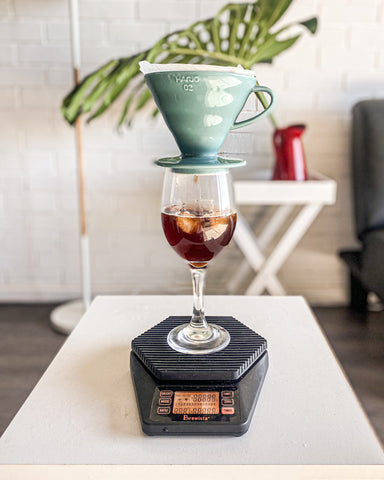
Initially, this blog post began with the title 6 reasons why coffee is nothing like wine. As you might have noticed, the topic of the blog has changed slightly. I'm Matt, the new(ish) marketing guy at Cape Coffee Beans, and I love coffee (particularly interesting and experimental coffee). I also love wine (particularly interesting and experimental wine). When Phaedon (the boss) suggested we write a blog post on why coffee is nothing like wine, I thought this was a great idea. That is until I began to write it, and I quickly realised that I think that coffee is quite a lot like wine.
So instead of the initial idea, I am writing this blog post with 6 reasons why coffee is just like wine and Phaedon is writing another blog post - 6 Reasons Why Coffee Is Nothing Like Wine. We'll let you read them both and make up your own mind, and we'd love to hear your thoughts!
So without further ado, here are 6 reasons why coffee is just like wine.
1. Flavour
Every time a coffee lover hears the expression “it just tastes like coffee”, something inside of us dies a little. If you are a wine lover, I’m pretty sure it’s tantamount to the expression “it tastes like red/white wine”. The reality is that coffee, like wine, is complex and nuanced, with a myriad of flavours to be found, explored and tasted.
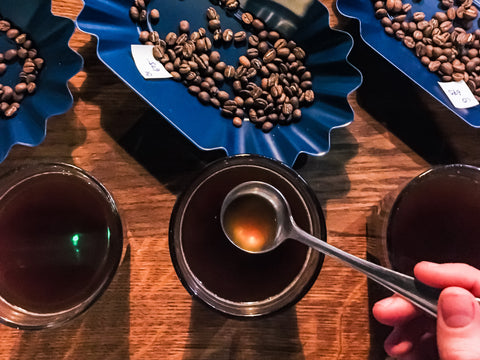
You might be thinking to yourself “but wine has things like sommeliers and entire careers dedicated to professional tasting and quality control.” Well, coffee has these as well. They are called Q-graders, and they are highly respected within the industry. Admittedly, these sorts of careers in coffee are very much still in their infancy, but there is no doubt that they will evolve as the industry comes into its own.
2. Variety
I’m sure you’ve all heard the names of various grape varieties used in wine; words like Sauvignon Blanc or Merlot are firmly engrained in most of our vocabularies. Some of you might not know that the same amount of variation occurs in coffee fruit and with this variation comes very distinct flavour profiles. There are the more common varieties such as Bourbon and Caturra, then there are the highly prized and notoriously difficult to grow varieties such as Gesha, not to mention the rare and exotic varietals like Marogogype or Pacas, and there are even laboratory-developed varieties such SL28 or SL34. In short, there is no shortage of diversity.
Coffee lovers around the world are only just beginning to pay more attention to the coffee variety that they are drinking, but as the supply chain becomes more transparent and we have access to more information about our coffees, these details will become increasingly important.

3. Viticulture & Wine Making
This leads us quite nicely to the topic of viticulture - the study of wine farming. Each variety needs specific attention and care. Some coffees grow better in sunlight, others in shade. Certain varieties are disease resistant, and others you need to be wary of. With so much variety and specialty coffee farming being a relatively new branch of the coffee industry, there is very little formal education in this field. The best education you can get in coffee farming is to study viticulture. Although the specifics might be different, the overarching agricultural concepts still apply! Many viticulture professionals are having a huge influence in the coffee-growing world and many people who studied viticulture are finding themselves more and more drawn into the world of coffee farming.
Not only does the study of wine growing help coffee farmers, but due to the controlled fermentation that is needed to process coffee, knowledge of winemaking can also be invaluable to coffee producers. If you're interested in reading more on coffee processing, check out our blog post on the topic.
4. Terroir
Yes, I know, terroir is quite a pompous French word, but it is very applicable here. Terroir refers to the characteristic taste and flavours imparted to a wine by the environment in which it is produced. Most casual wine drinkers wouldn’t have the experience, or a palate developed enough to distinguish where a wine comes from, however, this difference in terroir is strikingly prominent in coffee!
From the vibrant citrus and berry notes of a Kenyan to the florals of an Ethiopian or the chocolate hazelnut flavours of a Brazilian, the terroir of coffee is clear and distinct. People have their favourite origins for a reason! Having said that, the cutting edge of the specialty coffee scene is in constant search of that truly unique coffee bean that tastes like nothing you have ever tried before.
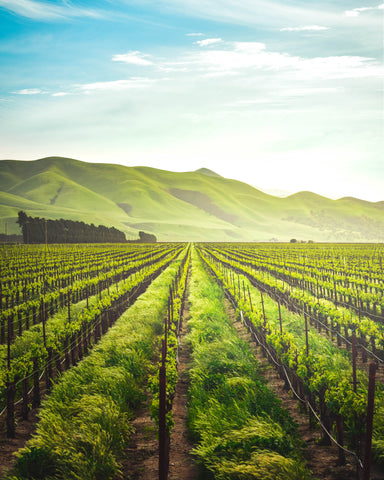
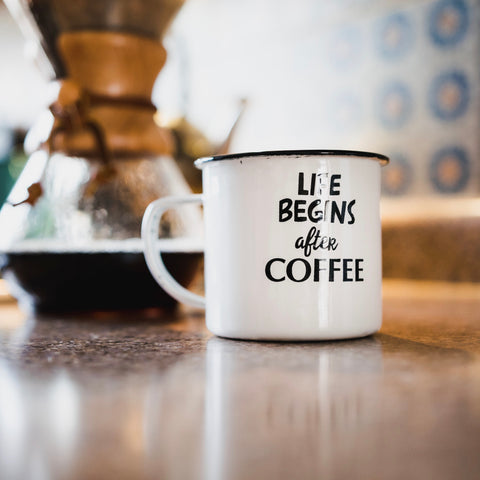
5. Routine
This blog post isn't only going to be about technical stuff. There’s also a huge element of how coffee exists and interacts with us as people and the role it plays in in our day to day lives. There is no denying that coffee is habitual, it is a part of our daily lives and our routine. There is a comfort to that warm cup of coffee before your day begins that is not too different from the comfort and the sigh of relief that comes from that glass of wine on a Friday night. Flavours can evoke potent feelings or emotions within us. This effect with coffee is very similar, yet the complete opposite of wine. You might say that coffee is the on-button on a Monday morning, while wine is the off-button on a Friday night.
6. Culture
The cultural impact of coffee is going through a bit of a renaissance at the moment. For years, cafes were viewed in a similar vein to fast food joints: get in, get your fix, get out and get on with your day. This mentality is changing drastically. Cafes are becoming social hubs of the community, places for people to meet up, catch up, and spend time together. In a large way, the cafe is replacing the bar as the go-to gathering place. This is happening to such an extent, that cafes have begun to extend their opening hours into the evening and even started selling wine.
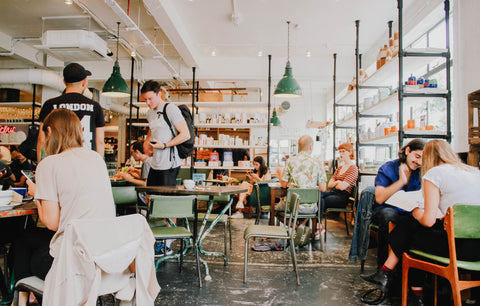
While there still is the existence of “fast food cafes” (for lack of a better term), the emergence of this new type of cafe, a cafe that is interested in flavour, quality and experience, has largely blurred the line of where cafes end and bars begin. The only inherent difference in the experience of going out for a glass of wine or going out for a cup of coffee is the liquid in your glass and perhaps the time of day. Although this is a relatively new culturural phenomenon in South Africa, this has largely been the norm in European countries since cafes began, and I, for one, am very excited about its arrival.
What's the point?
Well done, if you managed to get through my meandering thoughts on coffee and wine, I think we've both done a good job. Although, at this point, I'm sure you are wondering (as am I), what is the point of this blog post.
After some reflection, I think the point is that there is no such thing as "just coffee". It is diverse and interesting and the industry is blossoming into this beautiful behemoth with so much to offer!
There is so much to be gained if we start treating how we purchase coffee the way we treat purchasing wine; we all have our favourite wine grapes, some of us have a favourite wine region, many of us love wine produced by certain farms and producers. Let's start paying attention to these similar (albeit also quite different) details in our coffee. Let's learn about our coffee's story. Let's not just have a favourite roaster, but a favourite origin, variety, producer and process!
I have to give credit where it's due, Phaedon said it perfectly succinctly in his blog post "Coffee... It's complicated".
About the author

Matt began his coffee journey as a humble barista. After working his way up through the years to eventually running a coffee roastery in Ireland, he realised that as much as he loved (and was mildly obsessed with) making coffee, he loved talking about it far more! This spurred a bit of sidestep in his coffee career where he moved into marketing and joined the team at Cape Coffee Beans where he gets to wax lyrical about the wonders of coffee all day long.

Comments
Nice article!
Posted by Darin on July 31, 2020
Thanks for the post Matt. I appreciate the parallels you were able to
draw between the two worlds. With regards to particularly the last two
points, I tend to think in terms of “social roles”. There seem to be
certain symbols attached to particular forms of consumption that evoke
certain moods and sometimes facilitate communication of a particular
kind. For example, people bond over cigarettes, even if it were
otherwise difficult for them to find a common topic. Likewise, there
is something liberating and encouraging about sharing a glass of beer
or wine – something much more than just the physiological action of
alcohol. Over the years I have found out that there exist certain
substitutes, more appropriate in some circumstances. Yerba mate based
soft drinks work for me, for example, successfully replacing beer when
I need to drive a car. So I guess what I wanna say is, despite a world
of difference between the two, coffee and wine share a tremendously
important social role of being catalysts for intellectual/cultural/social
activity. Think playing a game of Scrabble or Chess with a cup of
coffee or listening to Bach with a glass of wine.
Posted by Wojciech Gac on July 31, 2020
Excellent article ⭐️
Looking forward to ‘tasting’ more.
Posted by Lynette on July 31, 2020
Absolutely love the article and I biasly agree
Posted by Gerald Pietersen on August 11, 2020